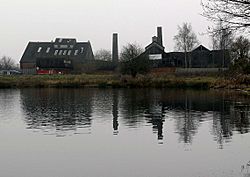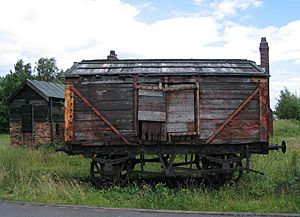Lion Salt Works facts for kids
Quick facts for kids Lion Salt Works |
|
|---|---|

Lion Salt Works in 2006
|
|
| Location | Marston, near Northwich, England |
| OS grid reference | SJ 670 754 |
| Founded | 1894 |
| Built for | John Thompson Junior |
|
Listed Building – Grade II
|
|
| Designated | 19 August 1986 |
| Reference no. | 1139103, 1160985, 1329875, 1329876 |
| Lua error in Module:Location_map at line 420: attempt to index field 'wikibase' (a nil value). | |
The Lion Salt Works is a special place in Marston, near Northwich, Cheshire, England. It's the very last place in the UK where salt was made using an old method called 'open pan salt making'. The salt works stopped making salt in 1986. Now, it's a museum where you can learn all about how salt was made.
Contents
History of Salt Making
The Lion Salt Works was started in 1894 by John Thompson Junior and his son, Henry Ingram Thompson. Their family had been making salt for a long time. They built a salt pan in the coal yard of the Red Lion Hotel in Marston.
The Thompson Family and Salt
Six generations of the Thompson family worked in the salt industry at this site. John Thompson Senior (1799–1867) first worked with wood and bricks. In 1842, he started a business shipping salt along the River Weaver to ports like Liverpool.
By 1846, he teamed up with his son, John Thompson Junior (1824–1899). They started digging salt mines and building salt works. They had many salt works and mines in areas like Witton, Marston, and Wincham.
After John Thompson Senior died in 1867, his business was split. John Thompson Junior continued the salt business with his sons, Henry Ingram and Alfred Jabez. In 1888, most of their business was sold to a large company called the Salt Union.
Even after the sale, the Thompson family stayed involved in salt. Henry Ingram Thompson started the Lion Salt Works. His sons, Jack and Alan Kinsey, joined him. Later, Alan Kinsey's son, Henry Lloyd Thompson, and Jack's grandson, Jonathan, also worked there. They ran the Lion Salt Works until it closed in 1986.
Earlier Salt Works on Site
The Lion Salt Works wasn't the first salt works here. In 1857, John Thompson Senior and Junior started the Alliance Salt Works on the same land. This site was later run by other family members. In 1888, it was sold to the Salt Union for a lot of money.
How the Lion Salt Works Grew
The Lion Salt Works began in 1894 when the Thompsons bought the Red Lion Hotel site. Henry Ingram Thompson dug a well for salty water (brine) and built the first salt pan and stove house.
By 1899, the hotel was gone, and more buildings were added. There were special pans for making butter salt and fishery salt. A manager's house and a workshop (smithy) were also built. By 1906, a small railway was added to move salt around.
The salt works sent salt to places like Canada, North America, and West Africa. In the UK, they sold salt to Cheshire, Manchester, and Liverpool.
Between the two World Wars, not much changed. They started selling salt to Denmark for curing bacon. But World War II stopped these sales. In 1937, Henry Ingram Thompson passed away. His sons, Jack and Alan Kinsey, took over. They dug a new brine well.
After serving in the Royal Navy, Henry Lloyd Thompson joined the company in 1947. He ran the salt works for 40 years. He built two more salt pans and stove houses in the 1950s and 1960s.
In the 1950s, most of the salt went to West Africa. This salt was special because it was light and flaky, called 'Lagos Salt'. It was perfect for the hot, humid weather there.
Henry Lloyd Thompson and his cousin Jonathan tried new things in the 1960s. They used new machines and even changed the works to run on recycled oil. They also started selling their own brand of salt.
By the late 1960s, the Lion Salt Works was the only place in the UK still using the old open pan method. The business closed in 1986. This was because of wars and political changes in Nigeria, which affected their main market. Also, cheaper salt from Brazil became available.
Saving the Salt Works
After the works closed, the local council bought the buildings to save them. In 1993, a charity called the Lion Salt Works Trust was formed. They worked to raise money to fix up the site.
In 2005, they applied for a grant from the Heritage Lottery Fund. In 2008, they received a huge award of £4.96 million for the restoration project.
In 2004, the Lion Salt Works was featured on a BBC TV show called Restoration. The buildings are now protected as Grade II listed buildings. This means they are very important and must be preserved. The site is also recognized as an important industrial heritage site in Europe.
In 2009, the site became owned by Cheshire West and Chester Council. After a big £10.2 million project, the Lion Salt Works reopened on June 5, 2015. It is now a popular visitor attraction. The restoration project won awards, including the best UK Heritage Project by the National Lottery in 2016.
The Museum Today
The Lion Salt Works has been beautifully restored as a museum. You can explore the buildings and learn how salt was made. The museum shows how salt affected the local economy and landscape.
You can see a rebuilt stove house with its salt pan, the old smithy (workshop), the engine house, and the brine tank. You can also see the rail tracks used to move salt. There's a café, a place for meetings, and a play area for kids.
See also
- List of Scheduled Monuments in Cheshire (post-1539)
- Listed buildings in Marston, Cheshire
- History of salt
- Open pan salt making
- Salt in Cheshire
- History of salt in Middlewich
- Weaver Hall Museum and Workhouse, Northwich
- New Cheshire Salt Works, a vacuum salt works in nearby Wincham
 | Jessica Watkins |
 | Robert Henry Lawrence Jr. |
 | Mae Jemison |
 | Sian Proctor |
 | Guion Bluford |


